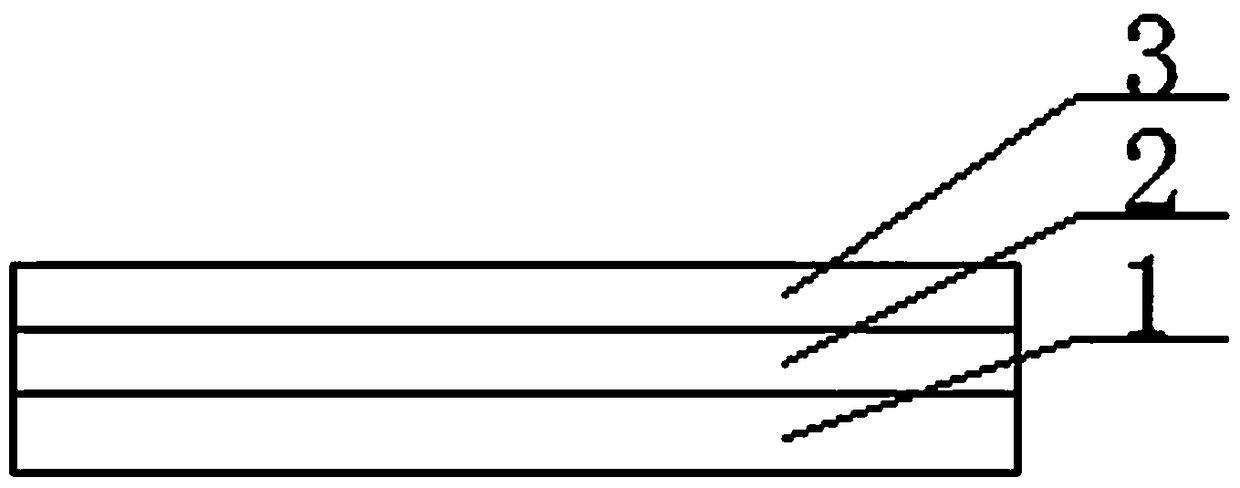On-press developing treatment-free thermal-sensitive plate with nano-micron-structure protective layer
A protective layer and nano-micron technology, which is applied to the photographic plate-making process on the pattern surface, photosensitive materials used in optomechanical equipment, printing plates, etc., can solve the problem of reducing the number of passing paper, polluting fountain solution, and normal temperature of film formation Poor permeability and other problems, to achieve the effect of high printing force and high wear resistance
- Summary
- Abstract
- Description
- Claims
- Application Information
AI Technical Summary
Problems solved by technology
Method used
Image
Examples
Synthetic example 1
[0096] Synthesis example 1 (emulsion particle P1)
[0097] Add 300g of isopropanol, 100g of deionized water, 10g (10% by weight) of exemplary compound A1 (n is 60) in a 1000ml four-necked flask with temperature-controlled heating, mechanical stirring, condensing reflux and nitrogen protection device, and heat and stir evenly , 70g (70% by weight) St (styrene), 10g (10% by weight) AN (acrylonitrile), 10g (10% by weight) HEMA hydroxyethyl methacrylate and 0.7g AIBN (azo Diisobutyronitrile), dropwise for 1 hour, add 0.3g AIBN (azobisisobutyronitrile) after another 7.5 hours of reaction, and continue to react for another 12 hours before ending.
[0098] The solid content is 25%, the GPC molecular weight is 93600, and the particle diameter is 200nm.
Synthetic example 2
[0099] Synthesis example 2 (emulsion particle P2)
[0100] Add 357g of isopropanol, 119g of deionized water, 10g (10% by weight) of exemplary compound A2 (n is 50) in a 1000ml four-necked flask with temperature-controlled heating, mechanical stirring, reflux and nitrogen protection device, and heat and stir evenly 60g (60% by weight) St (styrene), 20g (20% by weight) AN (acrylonitrile), 10g (10% by weight) HEMA hydroxyethyl methacrylate and 0.7g AIBN (azo Diisobutyronitrile), dropwise for 1.5 hours, add 0.3g AIBN (azobisisobutyronitrile) after another 7.5 hours of reaction, and continue to react for another 12 hours before ending.
[0101] The solid content (solute / solvent) was 21%, the GPC molecular weight was 76800, and the particle diameter was 150 nm.
Synthetic example 3
[0102] Synthesis example 3 (emulsion particle P3)
[0103] Add 417g of isopropanol, 139g of deionized water, 10g (10% by weight) of exemplary compound A1 (n is 40) in a 1000ml four-necked flask with temperature-controlled heating, mechanical stirring, condensing reflux and nitrogen protection device, and heat and stir evenly , 50g (50% by weight) St (styrene), 30g (30% by weight) AN (acrylonitrile), 10g (10% by weight) HEA hydroxyethyl acrylate and 0.7g AIBN (azobisiso Butyronitrile), dropwise time 2.0 hours, add 0.3g AIBN (azobisisobutyronitrile) after reacting for 7.5 hours, continue to react after 12 hours and end.
[0104] The solid content is 18%, the GPC molecular weight is 63700, and the particle diameter is 100 nm.
PUM
| Property | Measurement | Unit |
|---|---|---|
| Particle size | aaaaa | aaaaa |
| Thermal decomposition temperature | aaaaa | aaaaa |
| Particle size | aaaaa | aaaaa |
Abstract
Description
Claims
Application Information
 Login to View More
Login to View More - R&D
- Intellectual Property
- Life Sciences
- Materials
- Tech Scout
- Unparalleled Data Quality
- Higher Quality Content
- 60% Fewer Hallucinations
Browse by: Latest US Patents, China's latest patents, Technical Efficacy Thesaurus, Application Domain, Technology Topic, Popular Technical Reports.
© 2025 PatSnap. All rights reserved.Legal|Privacy policy|Modern Slavery Act Transparency Statement|Sitemap|About US| Contact US: help@patsnap.com



